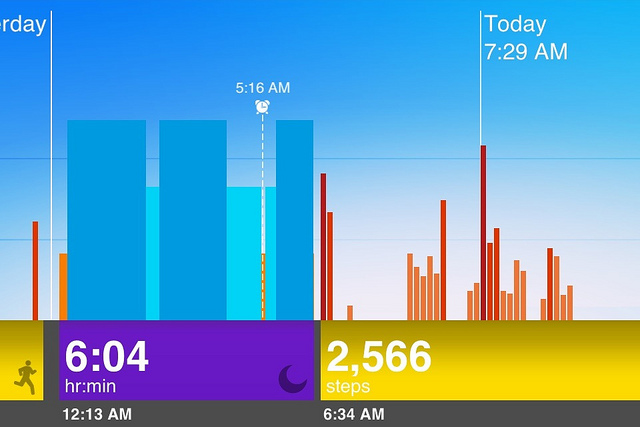
How data-driven solutions can transform health
Lexie Komisar is the strategic adviser of the Clinton Health Matters Initiative, a program of the Bill, Hillary & Chelsea Clinton Foundation, a collaborator on Knight News Challenge: Health. Below, she writes about emerging opportunities in health driven by the Quantified Self and Big Data movements. Photo credit: Flickr user Michael Hall. Related Links
“What’s next in Knight News Challenge: Health” by Chris Sopher
“Bring your best ideas; deadline nears for News Challenge: Health” by Chris Sopher
“Knight News Challenge: Health opens with inspiration phase, additional prizes from collaborators” by Raina Kumra and John Bracken
“Announcing key collaborators and details of Knight News Challenge: Health” by John Bracken and Chris Barr
“Join us to brainstorm ideas around News Challenge: Health” and There’s still time to brainstorm around News Challenge: Heath” by Chris Sopher
“Data: Why we care” by Esther Dyson
“News Challenge: Make APIs not apps, health CEO says” by Lucky Gunasekara
“Data provides a focus for community action” by Bryan Sivak
“California HealthCare Foundation: The data stops here” and “It takes a community to humanize health data” by Andy Krackov
“Data essential to promoting healthy habits” by Nirav R. Shah
“Pizza tracker versus patient tracker” by M. Bridget Duffy
Over the past few decades, the relationship between health, data and technology has dramatically evolved, and has increased access to information about health issues. As a result, individuals, communities and companies are becoming more knowledgeable and are better equipped to make healthier choices. At the center of this profound shift is what many have referred to as the Quantified Self movement, which aims to use technology to monitor and collect data about various aspects of daily life including behavior, mood, and health. At the same time, the utilization of “big data” is providing academics, institutions and governments with better tools to inform macro-level decisions regarding health policy and access.
Today, wearable personal tracking devices have taken self-monitoring to the next level, allowing individuals to track fitness, rest and eating habits, which may be used to make lasting behavior changes. Building on the insights of early health monitors for diseases like diabetes and hypertension, today’s devices offer such advantages as speed, accessibility and affordability. By using these tools to monitor trends and fluctuations, people might choose to ingest fewer calories, take the stairs more often or coordinate their schedules to get more REM sleep.
Just as tracking devices and the Quantified Self movement can inspire personal behavior change, parallel collections of large data sets may be effective in solving health crises at a macro level. Academics, for instance, have found that big data has the potential for vastly improving public health. From using air quality data to gain insight into the incidence of respiratory disease, to gathering information on social and sexual networks to predict the spread of infection, there are numerous ways in which big data can be used to create innovative solutions to widespread health problems.
This data revolution has already started to take effect with the rise of digitized databases and medical records, which make it easier for health care companies and organizations to analyze information from disparate sources. A recent McKinsey & Company report discusses the utility of big data for a variety of stakeholders within the health care system, including individuals, providers and payers. Addressing these critical areas becomes easier with smart use of data, ultimately improving health outcomes and the efficiency of health care.
Given the increased interest in health nationwide, coupled with the movement towards health-focused data collection, we’re seeing that better health is contagious. With increased access to data, people have both the ability to change their behaviors, and the knowledge to share their lessons with others. At the Clinton Health Matters Initiative, we provide a platform for people, communities and organizations to share these learned successes and further disseminate tools and experiences.
We recognize how important it is to leverage technology and digital innovation, and see amazing potential in its ability to advance health and wellness at national and community levels. Our work with Knight Foundation’s News Challenge is a prime example of how technology can elevate health. The Knight News Challenge asks innovators how best to utilize this health data revolution to help improve the health of communities where we work and live. The solutions that come out of the Knight News Challenge will positively impact the communities where the Clinton Health Matters Initiative works, including Coachella Valley, Calif.; Central Arkansas (Little Rock); northeast Jacksonville, Fla.; and Greater Houston.
In addition, to continue to help the Quantified Self movement evolve, we’ve inaugurated the first health-focused codeathon series. This series puts a twist on health and technology by not only challenging developers and designers to create innovative and original prototypes for applications based on social determinants such as sleep, but also challenging them to create such applications in a healthy environment. Already, we’ve completed our first codeathon in partnership with the Ace Hotel, Tumblr and Jawbone in New York, and intend to share the tools that emerge to help Americans sleep better.
It is an exciting time to participate in spurring people, communities and organizations to live healthier by harnessing the power of data and technology. Ultimately, by working with technology companies, research institutions and organizations, we aim to elevate and highlight the innovations that help to equip people with the tools to open-source the how of health.
This post also appeared on the Clinton Foundation’s blog on Sept. 12.
Knight Foundation has committed $2 million to News Challenge: Health. The Robert Wood Johnson Foundation will award prizes of $50,000, $30,000 and $20,000 respectively for the top three projects that “best combine public health data and health care data.” The California HealthCare Foundation will award $100,000 to one or more ideas that enhance the use of health data in local policymaking. For more visit newschallenge.org.
Recent Content
-
Journalismarticle ·
-
Journalismarticle ·
-
Journalismarticle ·


